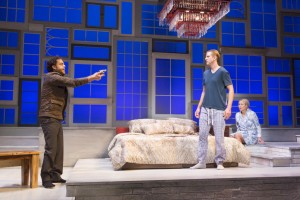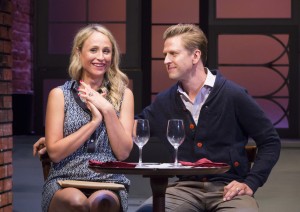In Laugh It Up, Stare It Down we are introduced to Joe (Jayce Bartok), who convinces Cleo (Katya Campbell), a woman he’s just met, that their encounter is a pivotal crossroads. This should definitely end in Cleo joining Joe for coffee, he posits. Cleo resists, claiming that she’s already met her “romantic crossroads”—a man named George. By the next scene, however, Cleo and Joe have been dating for two weeks and there’s never another mention of poor George. Not surprisingly, this isn’t the last brush with unfaithfulness in this play written by Alan Hruska and directed by Chris Eigeman.
The rest of the play follows in much the same way as these first two scenes. A plot is introduced, questions are raised, and then the story jarringly jumps to a point in the future, leaving the audience to wonder how exactly the couple got from point A to point B. From their first encounter to their looming demise when a hurricane strikes their town on Rhode Island, Laugh It Up, Stare It Down offers snapshots of climactic times in the couple's lives.
An absurdist play, Laugh It Up, Stare It Down is consistently zany. In one scene, Cleo and Joe’s baby is misplaced by a befuddled nurse before being found and returned to the nursery. In another scene, they sit down for dinner at a restaurant with blank menus and one entrée option. Unfortunately, scenes like this, though entertaining in their wackiness, detract from the script's more thought-provoking and philosophical side.
Bartok and Campbell realistically portray a couple navigating difficult situations and raising important questions like whether or not romantic love exists, or is merely an illusion killed by “a bit of intimacy.” Are they ready for children? Can they overcome infidelity? Can they maintain “ecstatic” love when life becomes routine? How will they feel when the end is near? All of the conversations revolving around these momentous milestones in their relationship create more questions still.
Bartok and Campbell are buoyed by Amy Hargreaves and Maury Ginsberg who play a variety of supporting characters and really add charm to the show with the different personalities they create. Hargreaves is moving as Alberta, vindictive as Dorothy and hysterical as the Waitress and Nurse Leaving. Ginsberg is detestable as Stephen, intriguing as Arturo and hilarious as Chalmers. It’s truly a treat to watch the supporting actors as they display their acting range.
The biggest standout of the night was the creative team behind Laugh It Up, Stare It Down’s ambiance. Kevin Judge's scenic design, Jennifer Caprio's costume design, Matthew J. Fick's original music and Peter Salett's sound design impressed throughout, but never more-so than during the final scene. A chandelier becomes a buoy, lighting and sound portrays a dark night out at sea, and the result is truly mesmerizing.
If you want a play that doesn’t require suspended disbelief, has a straightforward plot, and a standard happy ending, Laugh It Up, Stare It Down is not for you. This play creates more questions than it answers. But maybe that’s the point. Laugh It Up, Stare it Down isn’t perfect, but it’s certainly absurd—fitting for a show whose tagline is “Life Can Be Perfectly Absurd.”
Laugh It Up, Stare It Down plays through Oct. 10 at the Cherry Lane Theatre (38 Commerce Street) in Manhattan. Evening performances are at 7 p.m. on Tuesday, Wednesday, Thursday and Sunday evenings and 8 p.m. on Friday and Saturday evenings. Matinees are at 2 p.m. on Saturdays and 3 p.m. on Sundays. Tickets are between $59-$99 and can be purchased by calling 866-811-4111 or visiting Ovation Tix.



